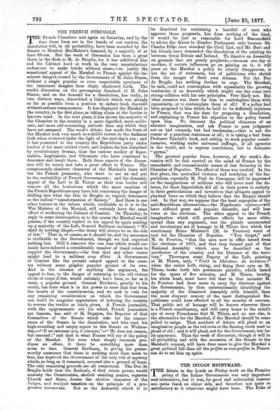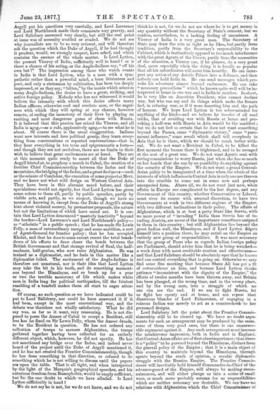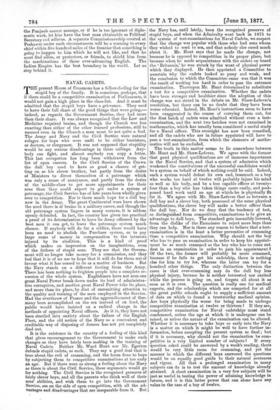THE INDIAN NIGHTMARE,
debate in the Lords on Friday week on the Frontier
policy of the Indian Government was very important and: instructive, but it was, for good and substantial reasons not, quite frank on either side, and therefore not quite so satisfactory as it otherwise might have been. The Duke of Argyll put his questions very carefully, and Lord -Lawrence and Lord Northbrook made their comments very gravely, and Lord Salisbury answered very clearly, but still the real point at issue was of necessity avoided or evaded. We do not see why journalists are to be so very reticent, and will therefore ask the question which the Duke of Argyll, if he had thought it prudent, would, we strongly suspect, have asked, and which contains the essence of the whole matter. Is Lord Lytton, the present Viceroy of India, sufficiently well in hand or is there a chance of his acting, as the Anglo-Indians say, " off his own bat I" The impression among those who watch events in India is that Lord Lytton, who is a man with a sym- pathetic rather than a powerful mind, a born litt6rateur and poet, and only a statesman by cultivation, has been too deeply impressed, or as they say, " bitten," by the mania which seizes so many Anglo-Indians, the desire to have a great, striking, and active foreign policy. Nobody who has not witnessed it would believe the intensity with which this desire affects many Indian officers, otherwise cool and resolute men, or the eager- ness with which they will spring at any chance, however remote, of ending the monotony of their lives by playing an exciting and most dangerous game of chess with Russia. It is believed that this passion has seized the Viceroy, and all India is agog,—.as a rule, applausively agog,—to see what he is about. Of course there is the usual exaggeration. Indians want new interests and love political gossip, they learn every- thing from conversations or reported conversations—that is, they hear everything in too terse and epigrammatic a form— and though they are not credulous, there are no limits to their wish to believe that great excitements are at hand. They are at this moment quite ready to assert all that the Duke of Argyll hinted at, to prophesy a march to Cabul, the erection of a frontier Chief Commissionership between the Indus and the mountains, the bridging of the Indus, and a great deal more—such as the seizure of Candahar, the execution of some project at Merv, and we know not what wild design on Western Central Asia. They have been in this alarmist mood before, and their speculations would not signify, but that Lord Lytton has given some colour to them all, partly by public speeches, partly by visible acts, and partly, as we suspect, though we have no means of knowing it, except from the Duke of .Argyll's strong hint about violated secrecy, by premature proposals, the nature but not the limitations of which have oozed out. It is cer- tain that Lord Lytton denounced" masterly inactivity" beyond the border—Lord Lawrence's and Lord Northbrook's policy— as " atheistic " in a public speech ; that he has made Sir Lewis Pelly, a man of extraordinary energy and some ambition, a sort of Agent-General for frontier policy ; that he has occupied Khelat, and that he does to some extent resent the total break- down of his efforts to draw closer the bonds between the British Government and that strange revival of Saul, the half- madman, half-genius, who now rules Afghanistan. He was trained as . a diplomatist, and he feels in this matter like a diplomatist foiled. "The excitement of the Anglo-Indians is therefore not unnatural, nor is their idea that Lord .Lytton may take the bit in his teeth, and do something moment- ous beyond the 'Himalayas, and so break up for a year or two the terrible monotony of life which makes white men in 'India long for political earthquakes, till the faintest rumbling of a tembril makes -them all start to eager atten- tion.
Of course, no such- question as we have indicated could be put to Lord "Baliabtuy, nor could he have answered it if it had been, except in 'the most conventional way, and the debate was therefore not wholly satisfactory. What he did say was, as far as it went, very reassuring. He is not dis- posed to press the Ameer of Cabul to accept a Resident, still less has he fixed.on Sir 'LewisTelly, whom the Ameer dreads, to .be the-'Resident in question. He has not ordered any collection of troops to menace Afghanistan, the troops gathered together having been collected for an entirely different object, which, however, he did not specify. He has not sanctioned any bridge over the Indus, and indeed never heard of the project until the Duke of Argyll mentioned it, and he has net created the Frontier Commissionership, though he has done something in that direction, or refused to do something which .he is not willing to discuss until the papers are upon the table. That' is all right, and when interpreted by- the light. of the Marquis's geographical speeches, and his notorious freedom.from Russophobia, would be amply sufficient, but tor the one'-doubt to whith 'we have alluded. -Is Lord Lytton sufficiently in hand !
We do not say he is not, Tor we do not know, and we do not
think he is not., for we do not see where he is to get money in any quantity without the Secretary of State's consent, but-we confess, nevertheless, to a lurking feeling of uneasiness. A Viceroy of India is a very great man. The Secretary of State may draw the rein as tight as he likes, but partly from tradition, partly from the Secretary's responsibility to the Cabinet, which is instinctively opposed to too much interference with the great Agents of the Crown, partly from the necessities of the situation, a Viceroy can, if he pleases, do a very great deal, more especially when the doing it is locally so popular that all his subordinates will assist him heartily. He can inter- pret any action of any Asiatic Prince into a defiance, and then nobody can hold India in. He can send messages which pro- yoke his adversary almost beyond endurance. He can take " necessary precautions " which he knows quite well will be in- terpreted at home in one way and in India in another. In short, he is very like an American President, who cannot declare war, but who can say and do things which make the Senate feel, in refusing war, as if it were deserting him and the path of honour. We hope Lord Lytton is too sober-minded for anything of the kind—and we believe he is—for of all mad tricks, that of avoiding war with Russia at home and pro- voking a half-war with Russia in Asia would be the maddest ; but we do not feel so certain that he does not want something beyond the Passes, some " diplomatic victory," some " para- mount influence," some result which shall tell everybody in Asia that he is there, which we should be much better with- out. We do not want a Resident in Cahill, to be killed the first moment the bazaar there is frightened, and to be avenged at the cost of a great war. We do not want Agents sent with roving commissions to worry Russia, just when she has so much on her hands that she can by no possibility do anything against the security of the Empire. We do not want a grand Central- Asian policy to be inaugurated at a time when the whole of the interests of which influence in Central Asia is only one are thrown into the crucible to come out in some new and perhaps unexpected form. Above all,- we do not want just now, -when affairs in Europe are complicated to the last degree, and any Government of this country, whether Conservative or Liberal, must steer its course with unusual discretion, to have two Governments at work in two different regions of the Empire, with two different inclinations in their policy. The affairs of Afghanistan, which is at best a petty State like Servia, with no more power of " invading " India than Servia has of in- vading Austria, are never of the importance sometimes assigned to them in this country ; but still Afghanistan lies beyond the great Indian wall, the Himalayas, and if Lord Lytton fidgets himself into a position there, he may entail on the Empire an entirely new group of responsibilities. It was most necessary that the group of Peers who as regards Indian foreign polity are Parliament, should advise him that he is being- watched— a -work done with most creditable caution and effectiveness— and that Lord Salisbury should be absolutely sure that helnows and can control everything that is going on. Otherwise we may find some fine morning that because Shere All has got a fit of outrecuidance on him, and because Lord Lytton thinks patience " inconsistent with the dignity of the Empire," the efforts of twelve months have been thrown away, and Britain has been plunged, at the wrong time, and in the wrong place, and by the wrong man, into a struggle of which -no one can see the end. If we are to fight Russia, let us fight her openly and at home, and not repeat ithat disastrous blunder of Lord Palmerston, of engaging in a ruinous Indian war merely to act as a countercheck • to her presumed designs. Lord Salisbury left the point about the Frontier Commis- sionership still to be cleared up. We have no doubt argu- ments for such an arrangement' may be produced by 'the ream, some of them very good ones, but there is one unanswer- able argument against it. Any such arrangement mustincrease the mischievous impression, both in India and in England, that Central-Asian affairs are of first-class importance ; that there is a " policy" to be pursued beyond the Himalayas, distinctfrom the general policy of the Empire ; that it is a main object of this country to maintain beyond the Himalayas, 'through agents beyond the reach of opinion, a secular diplomatic straggle with the Russian Empire. The Frontier Commis- sioner will inevitably hold himself Commander-in-Chief' of-the
advance-guard of the Empire, will always be making recon- naissances, and -will either plunge -us into a series-Of- small wars, or much more probably assume for us responsibilities which are neither necessary nor desirable. We eon-have-no relations with Afghanistan-which the Chief Commissioner• of
the Punjaub cannot manage, or if he is too ignorant of diplo- matic work, let him have the best man obtainable as Political Secretary and adlatus. A separate Commissionership created at Peshawur under such circumstances will be a warning to every chief within five hundred miles of the frontier that something is going to happen to him which he will not like, and that he must find allies, or protectors, or friends, to shield him from the machinations of those ever-advancing English. The Indian Empire has the best boundary in the world. Let us stop behind it.




































 Previous page
Previous page